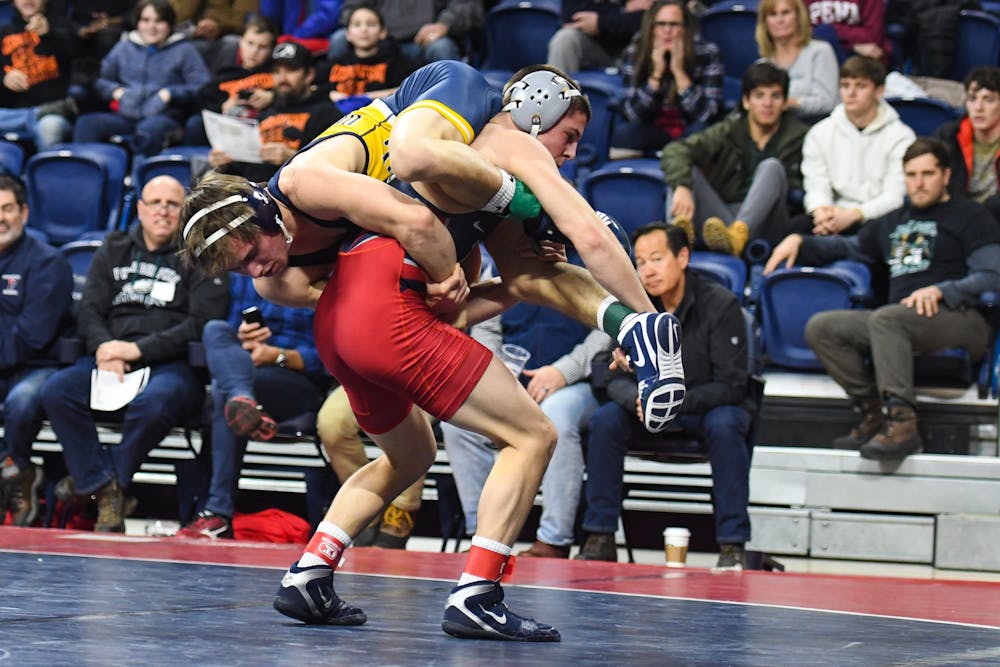
Wrestling was a sport Doug Zapf grew into. Literally.
Zapf began his wrestling career primarily competing in the 133-pound weight class, but has moved up to 141 pounds in his sophomore season.
It’s normal for high school and college wrestlers to move up in weight classes as they continue to grow, so it wasn’t unexpected when Zapf started wrestling at a slightly higher weight.
“We kind of figured ‘Hey, this young man’s [going to] grow.’ Doug has an older brother who plays football at West Chester University. [...] We figured he would grow, but we didn’t know how much,” coach Roger Reina said. “I think he’s done a terrific job with his strength training program and lifting program.”
Zapf has seen success in both weight classes. He is one of the most valuable assets for the Quakers (5-4, 4-1 Eastern Intercollegiate Wrestling Association) so far this season. This past weekend when Penn faced Brown and Harvard, he increased his season record to 20-5, and has gone 11-0 against EIWA opponents.
“I think sometimes with weight classes you change the way you wrestle, but I think from 133 to 141, [there] really hasn’t been any difference for me. I really don’t think I wrestle any differently,” Zapf said.
A starting freshman last season, Zapf ultimately received honorable mention All-Ivy honors. His season included a sixth-place finish at Penn’s own Keystone Classic. He improved upon this to bring home this season's title at 141 pounds, defeating his teammate, senior A.J. Vindici, in the final. The Quakers won the Keystone Classic this year, undoubtedly behind the performances of wrestlers like Zapf.
“The step up from being a really successful high school wrestler, even in a top state like Pennsylvania, to being a Division I wrestler is a really big step,” Reina said. “He stepped in as a starter last year, won a good number of matches, and I think really began to prove himself and continue to get better as the season went on last year."
Diligence and determination have been constants for Zapf throughout his career, starting in high school: Zapf attended Downingtown West High School, just about an hour away from Penn.
When he began to compete at the high school level his freshman year, Zapf weighed 95 pounds. The lowest weight class was 106 pounds, so he was often wrestling people more than 10 pounds heavier than him.
“Most of those kids were coming down from 112 and 115. There were a lot of matches when he was a freshman [where] he looked very, very tiny," said Brad Breese, Zapf’s high school coach. “He did not let that stop him. He battled them, he beat good kids [in] that weight class just by sheer determination."
But Zapf had come into high school with a few wins on his back.
“He had won some big tournaments. He had done some good things. Everybody had real high hopes for him. The only problem was he was really small,” Breese said. “So even though everybody had real high hopes for him, he had a lot of size to make up for, and that did affect him his freshman year. But he worked really, really hard.”
Breese takes no credit for convincing Zapf to continue wrestling beyond the high school level; Zapf already had plans to do so during his freshman year. As Breese puts it, Zapf was incredibly self-motivated, and the coach encouraged him to keep working hard to achieve what everyone thought came easy to him.
“It really wasn’t [a question of] if I wanted to do it or not because even going into high school, I was kind of set on wrestling in college because I just enjoyed it and I knew was probably good enough to wrestle at some level in college,” Zapf said.
During his junior year of high school, Zapf was a Pennsylvania AAA state champion, wrestling at 106 pounds. This would help qualify his ability to wrestle at the D-I level in college.
This year, Doug has made some slight changes to his lifestyle. He has transitioned to eating a more plant-based diet, something he hopes will have positive long-term effects on his athletic ability.
“It makes me feel a lot better in general and making weight is easier,” said Zapf, who is coincidentally minoring in nutrition.
One thing that seems to have remained the same for Zapf is how hard he works. Zapf is obviously a talented wrestler, but he puts in a lot of effort off the mat to maintain his success. This is a trend he has continued since high school.
“No one really knew how hard he was working just to maintain what everybody thought he should do,” Breese said.
“He has a tremendous work ethic, he’s really thoughtful, he’s a strong student at his sport, and I think all of those things come into play [and] speak to his development right now,” Reina said.
The Quakers will face Columbia and Cornell this Saturday at the Palestra, and Zapf will have a chance to show off just how good he is.
The Daily Pennsylvanian is an independent, student-run newspaper. Please consider making a donation to support the coverage that shapes the University. Your generosity ensures a future of strong journalism at Penn.
Donate







